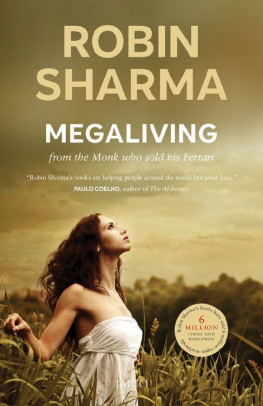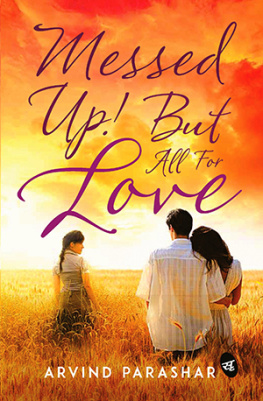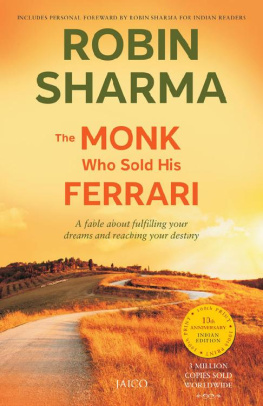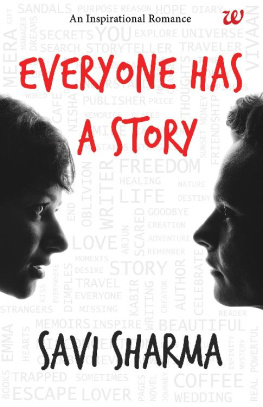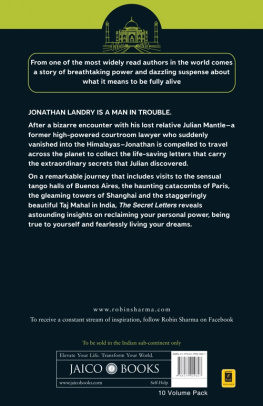Published by State University of New York Press, Albany
2019 State University of New York
All rights reserved
Printed in the United States of America
No part of this book may be used or reproduced in any manner whatsoever without written permission. No part of this book may be stored in a retrieval system or transmitted in any form or by any means including electronic, electrostatic, magnetic tape, mechanical, photocopying, recording, or otherwise without the prior permission in writing of the publisher.
For information, contact State University of New York Press, Albany, NY
www.sunypress.edu
Library of Congress Cataloging-in-Publication Data
Names: Sharma, Arvind, author.
Title: An accidental theodicy : genuflexions on a fractured knee / Arvind Sharma.
Description: Albany, NY : State University of New York, [2019] | Includes bibliographical references and index.
Identifiers: LCCN 2017032622 | ISBN 9781438470078 (hardcover : alk. paper) | ISBN 9781438470085 (pbk. : alk. paper) | ISBN 9781438470092 (ebook)
Subjects: LCSH: Sharma, Arvind. | HindusBiography. | KneeWounds and injuries. | Theodicy.
Classification: LCC BL1175.S4235 A323 2020 | DDC 294.5092 [B]dc23
LC record available at https://lccn.loc.gov/2017032622
10 9 8 7 6 5 4 3 2 1
For every bad thing there might be a worse; and when one breaks his leg let him be thankful that it was not his neck.
Bishop Hall
PART I
THE ACCIDENT
I
The day: Friday, June 8, 1990. The time: 4:47 p.m. The place: just outside the driveway to 3520 University Street (otherwise known as the Birks Building) at the outer perimeter of McGill University, Montreal. As I approached the driveway on the pedestrian walk I saw the light at the crossing ahead turn red. This meant, I thought, that I could safely cross the road, since University Street was a one-way street. I was wrong. I had hardly moved a few steps from the curb when I heard a bang. It came from my knee striking the side of a car, bang on. The next thing I knew I had fallen on my derrire, perilously close to a parked car but not on it. And right in front of me, now barring my vision, a blue car had come to a stop.
Before I knew what was happening a young woman rushed to my side from the sidewalk. She put her hand across my back as she bent down and shouted, Dont move. Dont move. Then she asked, Are you all right? I looked around at everything from the car-handle level and said faintly, I think so. Again admonishing me not to move, she shouted to a passerby, Please call an ambulance. A person has been hit by a car.
In retrospect it is not hard to reconstruct how this fate had befallen me. As I had veered off the sidewalk, somewhat impulsively, to cut across the road on the hypotenuse of the Pythagorean triangle, a car that I had a moment ago passed on foot had begun to pull out of the parking spot. I hadnt looked both ways before crossingright, left, rightas one is supposed to. I had just looked forward, in keeping with my forward-looking disposition, as my colleagues would gently chide me later. Somehow the driver of the car also failed to spot me in the rear mirror. It was not as if an irresistible force had met an immovable object (when that happens a child is said to be born)rather, a sluggish car had backed into an ambling pedestrian. But the doorknob of the car had hit the pedestrian in the knee and he now sat on his bottom, hors de combat in the Montreal rush-hour traffic in summer, during a month in which the rate of automobile accidents in the city goes up by over 10 percent. The accident, one would think, had a probabilistic point to prove, and I had become a statistic in this world of statistical contingencies. Not everyone can be a statistician, but anyone can become a statistic.
Not quite. To my considerable amazement the ambulance arrived in three minutes. But time passed slowly, slowly enough for me to learn that the young woman who stood solicitous guard over me was a student of nursing (or was it social welfare?) in the building next to Birks and close to the university gate, the very building in which I was to teach my Hindi class at 5:00 p.m. I even saw a student, Roger I think was his name, pass by, and we even waved to each other, under conditions that left me mildly embarrassed but left him totally nonplussed (Is he going to hold the class in the middle of the street?). I asked the young woman to call our departmental receptionist. After all, I had been felled virtually in front of the very building in which I professed. That I should call for her was not without its touch of irony. A few weeks earlier she had been knocked down by a motorcycle, carried to the hospital in an ambulance, and then released after a medical checkup. When this was narrated to me I looked her over and said, Couldnt help giving a knock-out performance, could you? She had fixed me with a withering stare. There was thus an irony in the situation. Nor was it a fortunate irony either. One should watch ones words, one may have to swallow them, sometimes in unexpected ways. I would not recommend this diet to anyone. So I wasnt surprised when she came down, put her hand behind my back, and after making sure I was not gravely hurt, proceeded to inflict grievous bodily harm on my already wounded ego by saying, You cant help making a scene, can you?, smiling ever so gently. This she said as she left, after I had told her to announce to the Hindi class that it would not meet today. And to think that I was going to give them a quiz today! Now the quiz was on me. After she had left, someone from the knot of people who had gathered at the scene asked me to try to stand. At first the red light of medical caution flashed through my mind, but it soon turned to amber out of my own curiosity. I tried to stand, but I could feel my knee wobble and then almost buckle. So I just sat down and started surveying the scene of my own accident with a rather strange sense of detachment. This, I presume, has something to do with the bodys psychological defense mechanism called dissociation.
In the meantime, the driver of the car that had felled me had stepped out. The young woman attending me and now standing by my side had the good sense to ask him how he felt: Are you all right? Yes, but nervous, he said, nervously. I felt like shaking his hand, but some strange sense of legal caution prevented me from doing so, lest it might be held against me in some unforeseen way. I now reproach myself occasionally, and sometimes even bitterly, for not doing so. Even if I cannot say whether I believe in it or not, at least I had been culturally gifted with the doctrine that others are only the instruments of our own karmic destiny. But I hesitated lest the gesture be misunderstoodby him or others. I hesitated too long. The moment was lost.




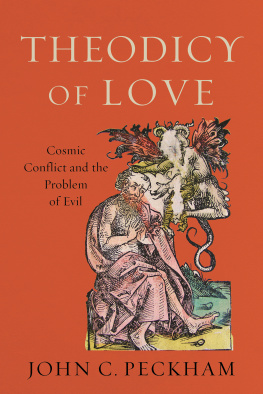

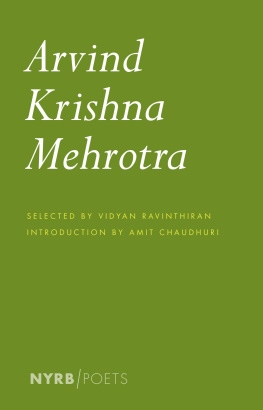
![Arvind Matharu [Arvind Matharu] - Understanding Cryptocurrencies](/uploads/posts/book/119680/thumbs/arvind-matharu-arvind-matharu-understanding.jpg)
